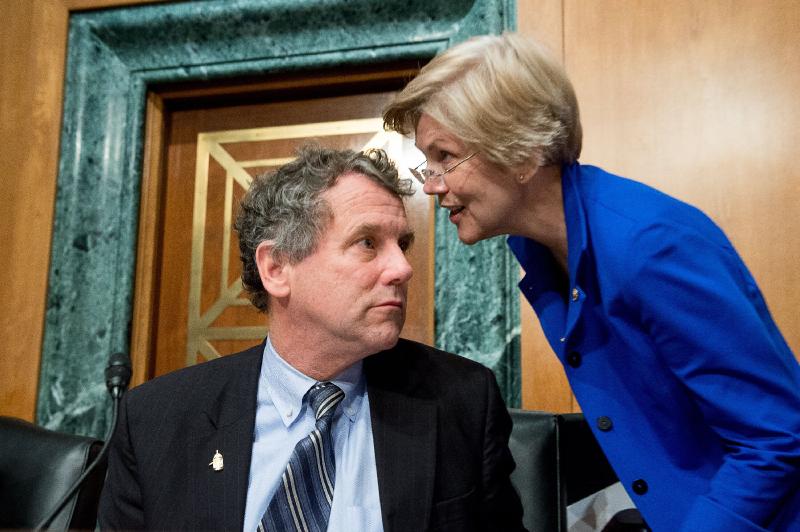Democrats Increasingly Worry About The Federal Reserve Crushing The Economy | HuffPost Latest News


Democrats and Republicans alike mostly support Powell's efforts, which have included the sharpest interest rate hikes in decades alongside selling off bonds the Fed purchased in order to protect the economy during the pandemic. After the sharp partisan split over spending last year, the bipartisan consensus on the Fed has been remarkable.
But more Democrats are showing signs of Fed skepticism, said Rakeen Mabud, chief economist at Groundwork Collaborative, a progressive think tank that has been warning about the dangers of tight monetary policy all year.
"We're seeing more and more lawmakers raising the alarm that the Fed is going down the wrong path, putting the incredible recovery that we've seen thus far in jeopardy," Mabud said, citing several comments from lawmakers since June.
"The Fed risks throwing our economy into a massive recession," Mabud said. "That's essentially what Powell has committed to doing. He's hacking away at the one leg of the stool that's holding up our economy, which is a strong labor market."

A small but growing number of Democrats worry the Federal Reserve could cause too much collateral damage in its quest to control inflation.
In a letter to Fed chair Jerome Powell on Tuesday, Sen. Sherrod Brown (D-Ohio) urged him to remember that Congress tasked the central bank with maintaining both stable prices and full employment. The Fed's actions could cause massive layoffs, the senator warned.
"For working Americans who already feel the crush of inflation, job losses will make it much worse," Brown wrote. "We can't risk the livelihoods of millions of Americans who can't afford it."
The letter represented Brown's strongest warning this year about the consequences of the Fed's interest rate increases, which are supposed to slow price growth by slowing down the entire economy ― a process that could cause a recession if the Fed pushes too hard.
Democrats and Republicans alike mostly support Powell's efforts, which have included the sharpest interest rate hikes in decades alongside selling off bonds the Fed purchased in order to protect the economy during the pandemic. After the sharp partisan split over spending last year, the bipartisan consensus on the Fed has been remarkable.
But more Democrats are showing signs of Fed skepticism, said Rakeen Mabud, chief economist at Groundwork Collaborative, a progressive think tank that has been warning about the dangers of tight monetary policy all year.
"We're seeing more and more lawmakers raising the alarm that the Fed is going down the wrong path, putting the incredible recovery that we've seen thus far in jeopardy," Mabud said, citing several comments from lawmakers since June.
"The Fed risks throwing our economy into a massive recession," Mabud said. "That's essentially what Powell has committed to doing. He's hacking away at the one leg of the stool that's holding up our economy, which is a strong labor market."
Powell has indeed suggested he thinks the labor market is too strong, with workers having an excessive amount of bargaining power for higher wages.
Sens. Elizabeth Warren (D-Mass.) and Bernie Sanders (I-Vt.) have led their colleagues in criticizing the central bank. Sanders said this month that the Fed is "hurting the situation" and that corporate greed is the real problem.
Warren has been more strident. "The Fed has no control over the main drivers of rising prices, but the Fed can slow demand by getting a lot of people fired and making families poorer," Warren said at a hearing in June.
Sens. Sherrod Brown (D-Ohio) and Elizabeth Warren (D-Mass.) both sounded the alarm about the effect the Fed's actions could have on workers.Andrew Harnik for The Washington Post via Getty Images
Interest rate hikes squeeze the economy by making money costlier to borrow, slowing spending and eventually resulting in slower price increases as demand falls into balance with supply. Powell has acknowledged that the Fed can't affect the supply problems contributing to inflation and that slashing demand will involve some "pain" for everyday people.
So far, the rate hikes have slowed down the housing market, which is heavily dependent on borrowing, but have not had an obvious effect on the broader economy. The latest data show inflation as high as ever and unemployment still at a very low 3.5%.
Powell and his colleagues are set to announce another rate hike next week, as well as fresh projections of the likely economic effect. In September, they estimated rate hikes would push the unemployment rate to 4.4% next year, which would likely amount to a recession. The September estimate was half a percentage point higher than the July estimate because of how little the rate hikes over the summer slowed inflation.
Several Democrats expressed concerns about the risks of rate hikes in a Politico article earlier this month. Sen. Chris Van Hollen (D-Md.) said it's "important that they not choke off the job recovery," and Sen. Tina Smith (D-Minn.) said higher interest rates aren't "all that effective for some of the most significant inflationary pressures that we're facing." But they and other Democrats still said they thought Powell was doing a good job.
Back in June, Sens. John Hickenlooper (D-Colo.) and Ben Cardin (D-Md.) voiced concerns as well. "When you raise interest rates it has a major negative impact, certainly on affordable housing," Cardin told The Hill.
Rep. Ro Khanna (D-Calif.), meanwhile, told CNN at the beginning of October that the Fed had been too slow to confront inflation and that it's now being too aggressive.
"The Fed hasn't gotten the blame they deserve," Khanna said.


I think (some) Democrats would like everyone to know that they want the credit for rising salaries and a tight labor market.
Rising prices?
That's somebody else's fault.
And doing what is necessary to reduce the supply of too much money chasing too few goods?
That's Powell's fault.